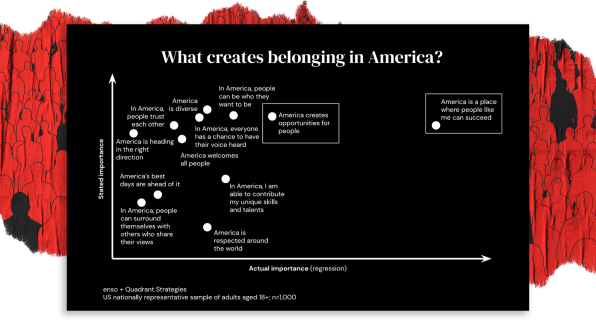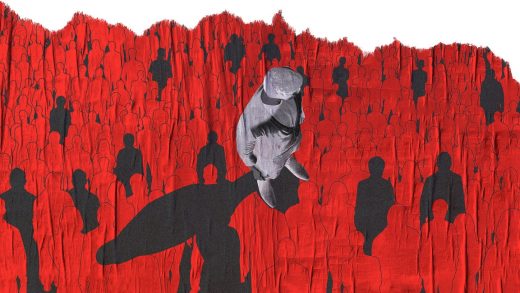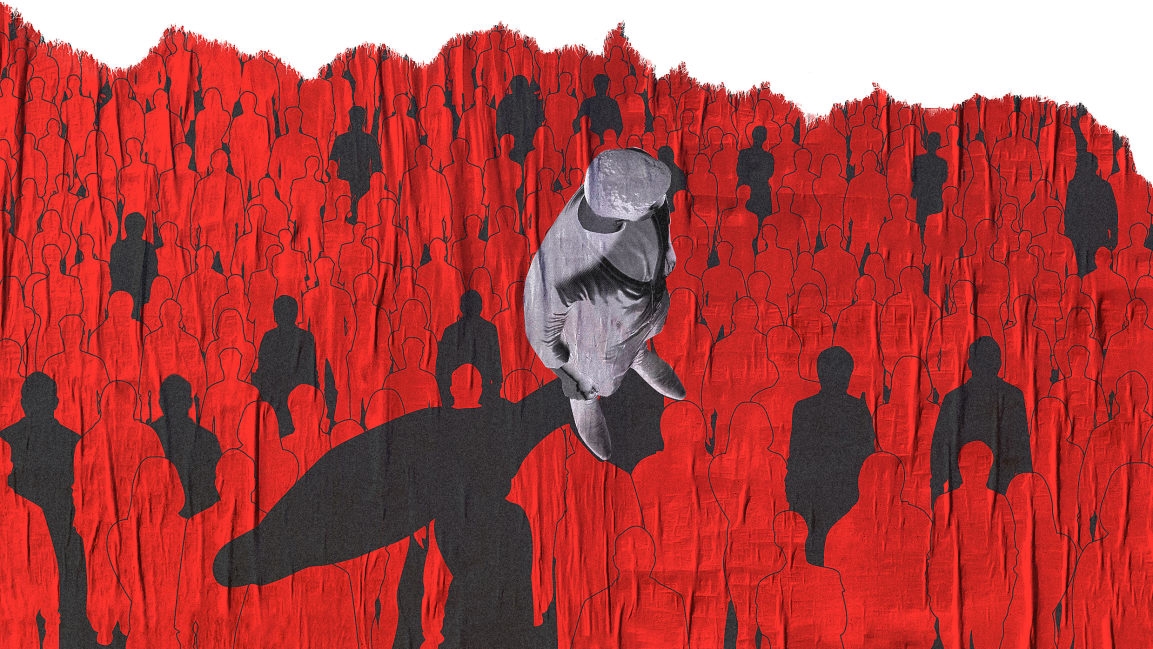A sense of belonging is what drives well-being—and it’s disappearing
The most striking revelation from an 80-year Harvard study of health and aging is that close relationships are what keep people happy throughout their lives, and these relationships with family, friends, and community delay mental and physical decline. These social ties are better predictors of our happiness and longevity than social class, IQ, or genetics.
Last year, our company, Enso, helped the large job website Indeed design research into how people thrive at work; the most striking revelation, published in this year’s U.N. World Happiness Report, is that although people think being paid well is the most important driver of being happy at work, actually our belonging at work is the most important contributor to happiness (by far).
So if social connection, or belonging, is the most important driver of our well-being, how are we doing after more than a year of social isolation, fear, uncertainty, and social tension? We define belonging as a sense of being accepted and welcome in a place, group, or organization, and we set out to uncover the state of belonging in America.
According to nationally representative research that we developed with Quadrant Strategies, 60% of Americans strongly agree to feeling belonging in America, but only 35% strongly agree to feeling belonging in their communities. This gap between belonging in America and belonging in communities suggests that while people feel a general alignment with the idea, and ideals, of America, the lived experience day to day, in our immediate communities, is not what we need it to be. Following the Harvard study’s findings, low community belonging is likely to mean less happiness, lower health, and shorter life outcomes.
There’s also a generational difference: Younger people feel a lower sense of belonging in America than older people (under 45 years old: 52%; 45 years and older: 68%). We also asked about political affiliation, and while Republican voters feel a stronger sense of belonging in America than Democratic voters (69% vs. 56%), both feel a weak sense of belonging in their communities (Democrat: 35%, Republican: 36%).

Partly these low levels of belonging may be explained by shifting cultural norms. Church membership is at historically low levels, local newspapers have closed across the country, people are more likely to live away from where they grew up, and 14% of respondents said they find the greatest sense of belonging at work. But these long-term trends were clearly exacerbated by the pandemic; many friendships atrophied, and now more than half of Americans report feeling lonely, a rise of 13% since 2018.
We wanted to understand what creates belonging, so we asked people what they think increases belonging, and the highest-rated attributes were “everyone has a chance to have their voice heard,” and “people can be who they want to be.” But we are also able to see in the data which factors actually drive belonging (via a regression analysis). Seeing America as “a place where people like me can succeed” was the most significant driver, followed by “America creates opportunities for people.”

This highlights one of the challenges in American life, and the American story: Individual success is so prized that community belonging can be de-prioritized, even though we know from many studies that belonging is what actually leads to successful life outcomes.
At the community level, a similar tension exists: We think being welcoming to all people is the most important driver of belonging, but actually the data reveals that “a place where people like me can succeed” and “being able to contribute my unique skills and talents” are the most important drivers. Again, individual opportunity is key to our sense of belonging, more so than representative diversity. In other words, it’s not enough to be seen and heard, we actually need to be able to contribute and succeed.
The risks of a belonging deficit
As the Harvard study shows, there are very compelling, positive reasons to boost belonging. But there’s also a real risk of low belonging. Because we are hardwired for social connection, we crave it and seek it out, and if we don’t find it in our community, we seek it out elsewhere. History shows that this is a dynamic that malevolent forces can use to their advantage: Hitler is just one example of creating a strong sense of belonging by denigration and dehumanization of others.
Absent a perceived ability to succeed and contribute, people may look for other ways to find belonging, or they may join a cause to be part of something bigger than themselves; the January 6th insurrection showed how this need can be manipulated in dangerous ways. We need positive, opportunity-based belonging to realize our potential and avoid repeating humanity’s worst moments.
Building belonging is a participation sport—and companies must step up
People have traditionally looked to social institutions to build belonging, including faith groups, sports teams, organizations, and governments. These all have a role to play. But as we have written before, businesses have a clear opportunity to build belonging, and by doing so, to create strong emotional attachments between the brand and its employees and customers. Enlightened companies are particularly well positioned to give people opportunities to contribute unique skills and talents, and to find success—the most important dimensions of belonging.

Small companies can do this effectively in their community; Politics & Prose, a bookshop in Washington, D.C., hosts regular readings, classes, and trips. And large companies can do this at scale, as Apple did in its stores (pre-COVID-19) with Today at Apple creative sessions, and as Lululemon, Harley-Davidson, Leica, REI, and National Geographic do with training and events. When we asked survey respondents which brands create a sense of belonging, Nike was the top answer, perhaps indicating that it effectively champions an empowering, inclusive mindset that people want to adopt, and because it gives people opportunities to belong, like the Nike Run Club.
While many companies have seen their role in the world as arms-length and transactional, selling to and communicating at people, enlightened companies create real value by inspiring and connecting people around opportunities to contribute. This is not a stretch from what companies do at their best, but it is a different way of existing in the world than we’ve seen from many multinational companies maximizing short-term shareholder value, which have systematically transferred and centralized opportunity to a few regional hubs and socioeconomic groups.
After a year of social isolation, sickness, and tension, companies of all sizes must get back to what they should be in business to do: create opportunities for people to do, to contribute, to succeed, not just to buy.
Sebastian Buck and Brian Hardwick are partners in Enso.
(137)



